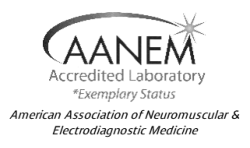EMG/NCV Laboratory Accredited

American Association of Neuromuscular & Electrodiagnostic Medicine certifies that Advanced Neuroscience Clinic PA has demonstrated compliance with all standards for lectrodiagnostic Laboratory Accreditation with Exemplary Status Demonstrates we provide excellence in Electrodiagnostic medicine. Proves our laboratory’s commitment to providing the highest quality health care and a safe environment for patients.
ABOUT YOUR EMG/NCV
An “EMG” (electromyography) and NCV (nerve conduction velocity) are special tests, which provide vital information about the health of your muscles and nerves. The EMG will measure the electrical activity of the muscles, and the NCV will measure the speed and intensity of electrical signals that travel along the nerve and how long it takes the muscles to respond to these signals.
Nerve and muscle cells produce tiny amounts of electricity. Nerves send the electrical signals to muscles, telling them to contract or relax. Muscles produce electrical activity when they move. If nerves or muscles are affected by injury, disease, or another condition, their electrical activity changes.
WHAT YOU CAN EXPECT
During the EMG procedure you may be asked to sit or lie down, depending on which area the physician or technologists are testing. A needle electrode is gently inserted into the muscle. You may feel some pain, a dull ache or pressure as it is inserted. Other electrodes are attached to your skin. The muscle is tested at rest (relaxed) and moving (flexed). The electrodes may be moved to get readings from different sections of the muscle. Several muscles may be checked depending on your symptoms. This test can take from 30-60 minutes or longer.
During the NCV procedure you may be asked to sit (less common) or lie down, depending on which area your body is being tested. Recording electrodes are placed on the skin, both to record and as reference points. A stimulating electrode is held against your skin and a tiny electrical impulse is sent to the nerve and responses are recorded. You may feel some tingling (like when you hit your “funny bone”), or your muscles, fingers or toes may twitch. This tiny impulse is an “unusual” feeling but is harmless. The electrodes are repositioned to test each different nerve site, depending on your symptoms. The test can take from 30-90 minutes or longer.
****Video will go here ****
PREPARING FOR YOUR EMG/NCV
Be sure to bathe or shower on the day of your test. Wash your arms and legs well to remove body oils. Do not apply any bath oils, lotions or creams, or use soap which has moisturizer in it. Oils can interfere with your test.
Eat your normal meals at your usual times. You may or may not be asked to avoid tobacco and caffeine for a few hours before your test.
Tell your physician about all the medications you are taking, especially blood thinners.
Be sure to tell the technologists if you bruise easily, have hemophilia or diabetes, any skin infections or a pacemaker.
Relax to ensure accurate results. Tense muscles can interfere with your test.
Wear clothes that are easy for you to remove as you will be asked to wear a patient gown for the test. Keep your arms and legs warm and relaxed.
YOUR COOPERATION IS ESSENTIAL ! The more relaxed you are, the more accurate your test results will be.
RELAX as completely as possible.
FOLLOW THE INSTRUCTIONS during the test.
AFTER YOUR TEST
You may return home or go to work and may experience a minimal amount of soreness in the tested muscles.
If you have additional questions, please feel free to call our office or speak with our technologist before testing begins.

